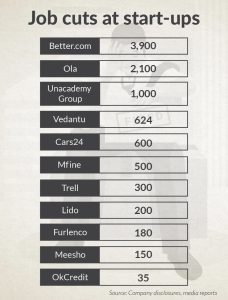
As markets bite, job cuts at Indian start-ups reach alarming proportions
“Currently, the external environment is tough. War in Europe, impending recession fears, and Fed rate interest hikes have led to inflationary pressures with massive correction in stocks globally and in India as well,” Vedantu cofounder Vamsi Krishna said

India, earlier this month, witnessed the birth of its 100th unicorn, which made the country the third-largest start-up ecosystem in the world after the US and China. However, the year 2022 has not been good so far for Indian start-ups, with many of them resorting to layoffs, and it could continue.
On May 5, the Ministry of Commerce and Industry said India is home to 100 unicorns with a total valuation of $332.7 billion. The term ‘unicorn’ refers to start-ups that attain a valuation of more than $1 billion.
According to the Commerce Ministry, the year 2021 experienced a huge surge in the number of unicorns, registering a total of 44 start-ups entering the unicorn club through the year with a total valuation of $93 billion. And, in the first four months of 2022, India gave birth to 14 unicorns with a total valuation of $18.9 billion.
Pride of the government
“Innovation in India is not just limited to certain sectors; we have recognised start-ups solving problems in 56 diverse sectors with 13% from IT services, 9% healthcare and life sciences, 7% education, 5% professional and commercial services, 5% agriculture, and 5% food & beverages,” the ministry said.
In January, Prime Minister Narendra Modi said start-ups would become the “backbone of new India”. “Our start-ups are changing the rules of the game. That’s why I believe start-ups are going to be the backbone of new India,” he told youngsters from various start-ups in an interaction.
However, the start-up boom witnessed in India in 2021 with record funding, aggressive hiring, and big pay packets, has now slowed down due to various factors including a funding crunch and the Russia-Ukraine war.
Thousands of jobs axed
According to a Business Insider report, Indian start-ups laid off 6,900 employees in the first four months of 2022. Cars24, Furlenco, Lido Learning, Meesho, MFine, OkCredit, Ola, Trell, Vedantu, and Unacademy are some that have let go of their employees from January to May.
Also read: Consumer rights body pulls up Ola, Uber over unfair trade practices
On Monday, an ET report said digital health platform Mfine had laid off around 500 employees, or 50 per cent of its workforce. Earlier in the month, used-car platform Cars24 fired 600 of its employees. Between December 2021 and March 2022, US-based digital mortgage start-up Better.com culled 3,900 jobs across its US and India offices.

According to a Business Insider report, Ola has laid off 2,100 contract workers and is closing its 200 retail outlets.
According to the latest report by IVCA-EY, Indian start-ups raised only $1.6 billion in April 2022. This is almost half of the capital raised by the same ecosystem in April 2021. No company entered the unicorn club last month, the report said.
Three key factors
Experts quoted by Moneycontrol said the trend of retrenchment is indicative of three key factors – focus shifting to profitability over customer acquisition and unmanageable expansion, subdued investment environment, and fear of a possible recession.
“A sense of pressure due to the war in Europe, money losing value due to inflationary issues, and investors asking hard questions on outcomes are contributing to the present scenario,” Aditya Narayan Mishra, CEO of CIEL HR, a staffing firm, was quoted as saying in the report. “The aggressive hiring by some firms as part of the talent war was made ahead of plans and now it is cooling off.”
Also read: Desi tech leaders in US invest $120 million in American version of IPL
Another expert said the current layoffs are a result of “unplanned hiring”. “The major reason for layoffs is unplanned hiring… usually start-ups are in a rush to on-board talents that might be of no use after some time,” Manas Pal, co-founder of PedalStart, a start-up enabler that supports early-stage start-up founders, told Forbes India. “Such layoffs and a toxic culture create conflicts and communication issues which later affect the mental health of employees.”
Edtech unicorn Vedantu, which laid off 624 employees, or 7% of its workforce, said it had to take this call due to a “tough” external environment.
“Currently, the external environment is tough. The war in Europe, impending recession fears, and Fed rate interest hikes have led to inflationary pressures with massive correction in stocks globally and in India as well. Given this environment, capital will be scarce for upcoming quarters,” Vedantu cofounder Vamsi Krishna wrote in a blog post.
Corporate governance issues
A Reuters report said corporate governance concerns loom large for investors facing a new uncertainty in global markets.
“We haven’t seen a slowdown like this in at least five to six years. It is going to be brutal,” said Anand Lunia of venture capital firm India Quotient, an investor in more than 70 start-ups since 2012.
Also read: Apple set to choose India over China to boost production: Report
“I expect to see a lot of zombie unicorns. Companies which became unicorns but have no business models have stopped hiring – they are not dying, but will become irrelevant,” Lunia added.
According to a Moneycontrol report on Monday (May 23), Orios Venture Partners, an Indian technology venture fund, has advised its portfolio start-ups to become conservative in hiring.
“We can’t say how long it will last but it’s prudent to factor this (capital constraints) in for the rest of 2022 and possibly the first half of 2023 this situation will continue. Become conservative with hiring. Take in only essential people and negotiate on salaries. This is important,” the venture capital (VC) company told start-up founders in a letter.
Y Combinator’s note of caution
Y Combinator, the US start-up accelerator, in a note, told all the founders of its portfolio companies to “plan for the worst”.
“No one can predict how bad the economy will get, but things don’t look good. The safe move is to plan for the worst. If the current situation is as bad as the last two economic downturns, the best way to prepare is to cut costs and extend your runway within the next 30 days,” YC wrote.
“Regardless of your ability to fundraise, it’s your responsibility to ensure your company will survive if you cannot raise money for the next 24 months… If your plan is to raise money in the next 6-12 months, you might be raising at the peak of the downturn. Remember that your chances of success are extremely low even if your company is doing well. We recommend you change your plan,” it added.

